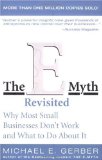57 Meditations on Kicking @$$ in Business and Life"4.8/5 stars" on Amazon
How To Build A Successful Business From The Ground Up (Tips From Gerber!)
If you love business and are, or are considering, starting a business, the book E-Myth by Michael Gerber (sketched below) is a must-read.
Gerber is a master of teaching business who has taught thousands of business leaders.
Here are some key takeaways from The E-Myth Revisited:
The Three Personalities Of Every Business-Person
1) The Entrepreneur
- The visionary
- The dreamer
- The catalyst for change
- Turns a trivial condition into an exceptional opportunity
Blind Spot: Most people are problems that get in the way of the entrepreneur.
2) The Manager
- The planner
- Thinks in the past
- The catalyst for status-quo
- Looks at opportunities as potential problems
The Manager chases after the Entrepreneur to clean up their mess…for without the Entrepreneur, there would be no mess!
3) The Technician
- The doer
- The tinkerer
- Lives in the present
- If the Technician doesn’t do it, it won’t get done
The Three Stages of Business
1) Infancy Stage
In Infancy, you (the founder) ARE the business. You’re often working 10+ hours a day and absolutely nailing your business. You’re likely mostly being the Technician described above.

How do you know if you’re in Infancy?
Answer: If you were removed from the business, the business would disappear.
So, you don’t want to be an Infant very long.
Infancy ends when you decide that your business can not continue to be run where it’s nearly 100% dependent on you (many owners quit in their Infancy stage).
2) Adolescence
If you don’t quit your biz at this point, you move on to the Adolescence stage.
Adolescence begins when you decide to get some help.
This is often precipitated by a crisis in the Infancy stage. 😉

Gerber cautions that a major mistake many entrepreneurs make during Adolescence is that when they make their first hire they Manage by Abdication (handing off an assignment and running away) rather than Manage by Delegation.
And Gerber points out that when you Manage by Abdication, the person/people you hired will begin dropping some balls…you may start to notice that:
- the product might not be quite the same quality as when you built it
- the marketing might not convert quite as well
- customer service might become a little loosey-goosey
The reason: because you didn’t teach your new hire well enough!
You weren’t being a good “Manager.”
And then the Technician in you jumps back into action…micro-managing every part of the business process to fix the product, the marketing, the customer service.
Before you know it, you are back doing all the work again…being the “Technician.”
At this point, a business usually faces 3 scenarios…they:
- Get Small Again — They go back to the Infancy stage; the owner may get rid of their new hire(s)) and revert back to a sole-proprietorship.
- Go For Broke — They just keep going and try to scale up…these usually end up in a melt-down.
- Remain An Adolescent — They stay put as a grumpy owner of a small poorly-managed business, usually to the detriment of their friends, family and, especially, their business.
But there is hope, Gerber points out, and that’s the highest level of a business performance.
3) Maturity
So how do you become a “Mature” business? Simple…you start out that way!

Gerber points out that IBM’s Tom Watson attributed the following to IBM’s success:
“I had a clear picture of what the company would look like when it was finally done”
“I then asked myself how a company which looked like that would have to act.”
“…we began to act that way from the beginning.”
“In other words, I realized that for IBM to become a great company it would have to act like a great company long before it ever became one.”
These moves by an “Entrepreneur” at the beginning of a business are thus quite key.
How To Create A “Mature” Business From The Ground Up
Gerber then recommends a series of tips/approaches to how an Entrepreneur can design a business from the ground up as one that will become mature and successful. They include:
- Turn-Key Systems — Provide the rest of the business with the system to execute. This will likely require documentation of the business’ systems in Operations Manuals that serve as a checklist for each component of your business.
- Work On Your Business, Not In It — “Your business is not your life,” Gerber emphasizes. It is an “organism…that will live or die according to how well it performs its sole function: to find and keep customers.”
- Your Primary Aim — You the business owner need to articulate (for yourself) your “primary aim” (as Gerber calls it). I call this a Life Purpose and you can try my How to Write A Purpose Statement article which includes an exercise that you could use to figure out your “Primary Aim” in life.
- Strategic Objective — Develop a clear statement of what your business has to do to help you achieve your Primary Aim.
- What’s Your Product — “What feeling will your customer walk away with? Peace of mind? Order? Power? Love? What is he really buying when he buys from you?”


